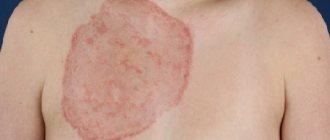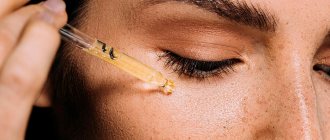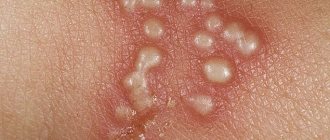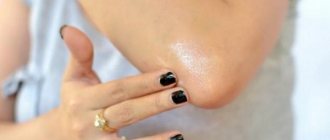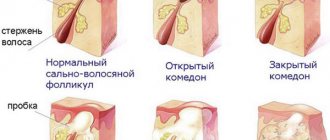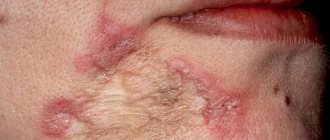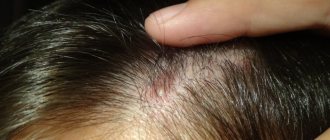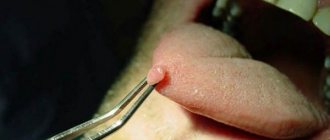- home
- Symptoms
Psoriasis is a chronic disease of a non-infectious nature, which mainly manifests itself in the form of redness and flaking of the skin. Occurring due to several factors at once, the disease can affect nails and joints.
It is currently impossible to cure psoriasis completely, but with proper therapy, long-term remission of the symptoms of the disease can be achieved.
Reasons for appearance
The causes of psoriasis have not been fully identified. However, there are several theories for the development of this pathology:
- Autoimmune.
- Genetic.
- Hormonal.
- Neurogenic.
- Metabolic.
None of the theories fully explains the origin of psoriasis and is not fully accepted by scientists.
Psoriasis is a multifactorial disease. External influences do not lead to its occurrence in 100% of cases. However, if there is a genetic predisposition, then these reasons can trigger the development of pathology. These factors include the following:
- Alcohol abuse.
- Tobacco smoking.
- Bites of various insects, especially leading to allergic reactions.
- Burns, including those caused by prolonged exposure to the sun.
- An incorrectly designed diet with a reduced amount of healthy vegetables and fruits, as well as an abundance of fatty, spicy and fried foods.
- Excessive consumption of caffeinated drinks.
- Increased physical and emotional stress, stressful situations and sleep disturbances.
- Decreased immunity, especially with HIV.
- Long-term use of lithium drugs, painkillers and hormonal drugs.
- Intestinal dysbiosis leading to problem skin.
- Infectious and inflammatory diseases of the skin, such as furunculosis, lichen, herpetic rashes, as well as fungal infections.
- Diabetes.
- Exposure of exposed skin to harsh chemicals and detergents.
Important! Frequent hand washing using special disinfectants washes away the protective film of the skin and beneficial microflora, which leads to disruption of the sebaceous glands and dry skin.
More of these negative effects on the body can be prevented and the development of the disease can be prevented.
People with thin and dry skin are more susceptible to psoriasis.
Treatment of psoriasis in men
Today, it is impossible to completely cure psoriasis, but with proper therapy, it is possible to achieve relief of symptoms and long-term remission of the disease. Since the disease is multifactorial, treatment must be approached using a whole range of measures. First of all, you should contact a dermatologist to make the most accurate diagnosis, including the form and stage of the disease.
As a result of the medical examination, the doctor can prescribe appropriate medications, as well as give additional recommendations necessary to increase the patient’s recovery rate. For initial symptoms of psoriasis, medications based on natural ingredients with the least side effects are prescribed. In severe forms of the disease, the doctor may prescribe a course of hormonal therapy to relieve the development of symptoms.
During the treatment of psoriasis in the groin in men, topical medications should be used. Such ointments and creams should moisturize the skin and soften the resulting scales. You should also choose a product that will contain an antiseptic and will not cause allergic reactions.
Often, in addition to topical medications, immunomodulators, glucocorticosteroids, vitamin complexes and salt baths can be prescribed. If the disease is caused by a hormonal imbalance, an additional course of drugs containing potassium, sodium or chloride is prescribed. Vitamins of groups A, B and E are prescribed to increase the body's defenses in combination with physiotherapeutic procedures, dietary nutrition and spa treatment.
How it begins: signs and photos
The peak age for the development of psoriasis is from 15 to 23 years , since at this time the body is subject to serious hormonal changes, as well as the teenage lifestyle.
Such physiological and psychological overloads can trigger the process of occurrence of this pathology. It is at this age that the disease manifests itself in 75% of young men who are prone to it.
Psoriatic rashes in men can occur on the penis, scrotum and skin folds of the groin area.
The development of the disease occurs very slowly and is not always noticeable in the early stages.
- Before visible changes appear, itching and flaking appear on the skin. Since men are less inclined to take care of their skin, these symptoms tend to go unattended.
- Then redness occurs in the area of peeling, and skin irregularities also form.
- The top layer of skin then dies, resulting in gray scale skin. Such scales are easily separated and in their place a weeping and sometimes bleeding surface of the skin remains. Such plaques can spread over time and occupy large areas of the skin.
Reference! Psoriatic changes on the skin are called papules in the form of vesicles, pustules - vesicles with pus and plaques.
Look how it looks in the photo. Here is the initial stage of psoriasis (itching and flaking):
The appearance of irregularities on the skin (crust):
Dying and peeling of the top layer of skin:
Symptoms at the first stage
Psoriasis is characterized by a constant change of remission and exacerbations. The disease is divided into 3 stages:
- progressive;
- stationary;
- regressive.
The first stage is progressive and lasts on average from one week to a month.
It is characterized by the following symptoms:
- The appearance of a large number of plaques on the skin, as well as their growth.
- The plaque has a specific red border at the border with a healthy area of skin.
- Severe skin itching.
- Dryness and flaking of the skin, formation of gray scales.
- When the scales are torn off, droplets of blood appear.
During this period, external influences on the affected areas of the skin are dangerous, as they lead to a deterioration in the general condition and excessive activity of the disease.
Diagnostic methods
Diagnosis is carried out by a dermatologist, who is able to recognize the disease by external examination. This is due to the fact that psoriasis rashes have a characteristic appearance and are significantly different from other skin diseases.
A specific diagnostic method is the psoriatic triad:
- stearin spots - rashes on the skin have an oily surface and are similar to stearin;
- terminal film , thin and smooth, appearing after the removal of the plaque;
- pinpoint bleeding that occurs when removing scales.
If all three manifestations are detected, the doctor diagnoses psoriasis.
Additional diagnostic methods are:
- Blood tests with a picture of an inflammatory nature.
- Skin biopsy , which is performed to exclude other skin pathologies.
- Bacterial culture for studying microflora.
What are the dangers of hormone-containing drugs?
As with any medications, when used for a long period of time, hormonal ointments gradually become addictive, as a result of which they become ineffective. But that's not so bad. The main danger is that with long courses or completely uncontrolled use of hormone-containing ointments, the development of skin atrophy is almost inevitable. Worse, this can provoke the occurrence of Itsenko-Cushing syndrome against the background of the development of skin atrophy.
Hormonal ointments are not advisable to use for uncomplicated psoriatic diseases. In fact, they provide only a temporary effect, affect the treatment of psoriasis superficially and certainly do not eradicate the problem.
The main danger is the likelihood of transformation of the disease and aggravation of its course.
How to treat?
A specific treatment for psoriasis has not yet been found , since the etiology of the process is not fully understood. Complete recovery cannot be achieved, but stable remission can be achieved.
Treatment methods are divided into medicinal and non-medicinal. All methods are aimed at eliminating unpleasant symptoms.
Medications include:
- Use of non-steroidal anti-inflammatory drugs.
- Cytostatics that reduce the rate of skin cell division.
- Ointments with anti-inflammatory and moisturizing effects.
- Systemic use of glucocorticosteroids.
- Prescription of immunosuppressants.
Non-drug methods:
- Vitamin therapy using vitamin D.
- Physiotherapeutic procedures using laser, ultrasound, cryotherapy, magnet, ultraviolet lamp irradiation.
- It is possible to use plasmapheresis, a special method of blood purification.
We highly recommend that anyone interested watch the video in which a 36-year-old man explains in detail how he managed to overcome psoriasis:
Salt baths
Many health resorts offer such procedures, but the method can be carried out independently. To eliminate age spots in this way at home, you need to purchase sea salt at the pharmacy. Dissolve about 200 grams of salt in one liter of boiling water, then add the mixture to the already filled bath at your usual temperature.
You need to take salt baths for at least 15 minutes, then rinse with cool water and let your body dry.
After the bath, you can carry out the usual cosmetic procedures, but it is not recommended to use soap and shower gels. For a lasting effect from the procedures, it is recommended to smear the skin with moisturizers. The particular effectiveness of salt baths can be observed in people involved in treatment in conjunction with herbal medicine.
Prevention
To prevent this disease, especially for people who have a genetic predisposition and are at risk, several rules must be followed.
Reference! The risk group includes people who have relatives with psoriasis, suffer from diabetes, have excessive dry skin, and also abuse alcohol and tobacco.
To prevent the development of the disease you should:
- Reduce skin injury and long-term exposure to solar radiation.
- Don't get tattoos.
- Timely treatment of chronic foci of infection in the body.
- Restoring the balance of microflora in the intestines.
- Complete abstinence from alcohol and nicotine.
- A balanced diet with sufficient vitamins and microelements.
- Reducing physical and emotional stress.
Psoriasis in men develops at a fairly young age and accompanies the entire life. Ignoring the problem for a long time can lead to various complications. Timely diagnosis and compliance with preventive measures contribute to long-term remissions and a full life.
Infertility and other complications that the disease can cause
Psoriasis is a progressive disease that eventually involves all systems.
Complications caused by the disease depend on:
- original form;
- timeliness of treatment;
- compliance with prevention;
- concomitant pathology.
The most common lesions are:
- joints;
- kidney;
- genitals, which can cause infertility;
- hearts;
- organs of vision.
